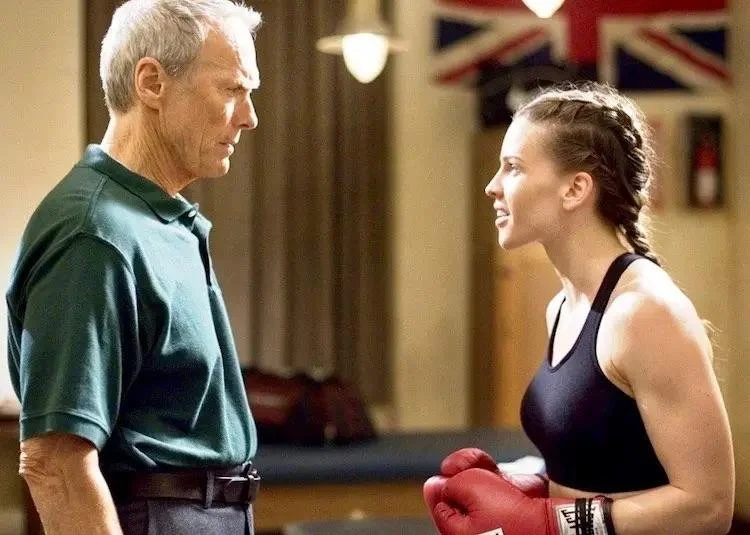#86: Million Dollar Baby
Release Date: December 15th, 2004
Format: DVD (full-screen version)
Written by: Paul Haggis
Directed by: Clint Eastwood
3.5 Stars
This seems like a good double feature pairing with Unforgiven, as both are Academy Award-winning Clint Eastwood films with Morgan Freeman in a supporting role. Plus I get to watch another DVD from my mystery grab bag. And it’s another full-screen edition! The early 2000s…what a time to be alive. On to the review!
If Million Dollar Baby was a boxer, it would be a talented one with a great pedigree. It would come out to the ring in a tasteful robe, with an air of nobility. When the fight begins, it would dance around the ring with grace, sticking jabs and throwing sharp right crosses. But in the middle rounds it loses some focus. It takes a round off to rest. It would allow its opponent to land some punches. It gets a cut above the eye. Keen observers start wondering why it abandoned its gameplan. They even begin to worry that it’s going to lose this fight.
In the last round it finally scores its knockout punch and the crowd goes wild. In the record books it will show up as a knockout win, but that won’t capture the full story of the fight. This thing was a tougher fight than it should have been.
The movie Million Dollar Baby earned seven Academy Award nominations and won the big ones (Best Picture, Best Director, Best Actress, and Best Supporting Actor). It was a critical and commercial hit in its time. I remember loving it as a young man and saw it twice in theaters. But go back and watch it and there are some obvious flaws.
Watching tonight, I noticed a degree of unrealistic emotional schmaltz to Million Dollar Baby that didn’t exist in Unforgiven. Both movies featured a protagonist played by Clint Eastwood, who is seeking forgiveness and paying penance for past sins. In Unforgiven, that means giving up drinking and trying to raise his two young children on his desolate prairie farm. There is a simple beauty in that. But in Million Dollar Baby, protagonist Frankie Dunn goes to Catholic mass every day, literally every day, for 23 years in an attempt to atone for ruining the relationship with his now adult-age daughter. And as if that wasn’t enough, Frankie also hand writes her multiple letters each week, which she returns to him unopened. He has boxes and boxes of unopened letters in his closet that he keeps. Writer Paul Haggis is throwing some emotional haymakers here, and they are wild ones. He’d be better served saving his energy for the later rounds. A year later in his movie Crash (which also won Best Picture), Haggis would cement his legacy as a talented, but flawed writer. He sometimes creates emotional heights that are so high they feel manipulative. He’d be an incredible propagandist, I think, with his natural ability to evoke.
In addition to this exaggerated character development in the script, there are also supporting performances that feel too implausible and loose for the movie’s tone. The worst offenders here are the family of Maggie Fitzgerald, the Hilary Swank character. They are poor white trash, but the type that you might see on a show on the CW Network. They are cartoonish and simply serve as a foil to Maggie, nothing more. They don’t fit within the tonal milieu of the three lead performances.
And it’s with these three lead performances that the movie absolutely sings. Any scene with some combination of Eastwood/Swank/Freeman is poetic and richly beautiful. The scenes sparkle, and they made me remember why I loved this movie so much twenty years ago.
Yes, I’m a bit critical of the Haggis script, and some of the performances, but overwhelmingly I think Million Dollar Baby creates several moments that are the very reason I love movies. I love Maggie’s reaction to Frankie agreeing to train her, or the scene of Scrap showing her where he sleeps in the gym, or Frankie telling Maggie about some community college classes that he hopes she could take. I get slightly emotional just writing about them, damn it.
So who cares if Million Dollar Baby has flaws? Since when does great art need to be flawless? By the climatic scene, when Frankie tells Maggie what “mo chuisle” means, the movie has landed its knockout punch.
